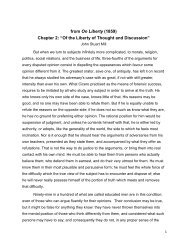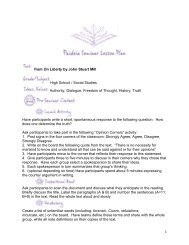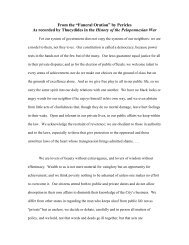Rousseau_contrat-social
You also want an ePaper? Increase the reach of your titles
YUMPU automatically turns print PDFs into web optimized ePapers that Google loves.
At once, in place of the individual personality of each contracting<br />
party, this act of association creates a moral and collective body,<br />
composed of as many members as the assembly contains votes, and<br />
receiving from this act its unity, its common identity, its life and its<br />
will. This public person, so formed by the union of all other persons<br />
formerly took the name of city,[4] and now takes that of Republic or<br />
body politic; it is called by its members State when passive. Sovereign<br />
when active, and Power when compared with others like itself. Those who<br />
are associated in it take collectively the name of people, and severally<br />
are called citizens, as sharing in the sovereign power, and subjects, as<br />
being under the laws of the State. But these terms are often confused<br />
and taken one for another: it is enough to know how to distinguish them<br />
when they are being used with precision.<br />
7. THE SOVEREIGN<br />
THIS formula shows us that the act of association comprises a mutual<br />
undertaking between the public and the individuals, and that each<br />
individual, in making a contract, as we may say, with himself, is bound<br />
in a double capacity; as a member of the Sovereign he is bound to the<br />
individuals, and as a member of the State to the Sovereign. But the<br />
maxim of civil right, that no one is bound by undertakings made to<br />
himself, does not apply in this case; for there is a great difference<br />
between incurring an obligation to yourself and incurring one to a whole<br />
of which you form a part.<br />
Attention must further be called to the fact that public deliberation,<br />
while competent to bind all the subjects to the Sovereign, because of<br />
the two different capacities in which each of them may be regarded,<br />
cannot, for the opposite reason, bind the Sovereign to itself; and that<br />
it is consequently against the nature of the body politic for the<br />
Sovereign to impose on itself a law which it cannot infringe. Being able<br />
to regard itself in only one capacity, it is in the position of an<br />
individual who makes a contract with himself; and this makes it clear<br />
that there neither is nor can be any kind of fundamental law binding on<br />
the body of the people -- not even the <strong>social</strong> contract itself. This does<br />
not mean that the body politic cannot enter into undertakings with<br />
12











